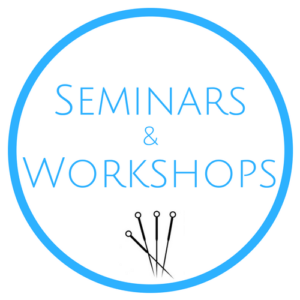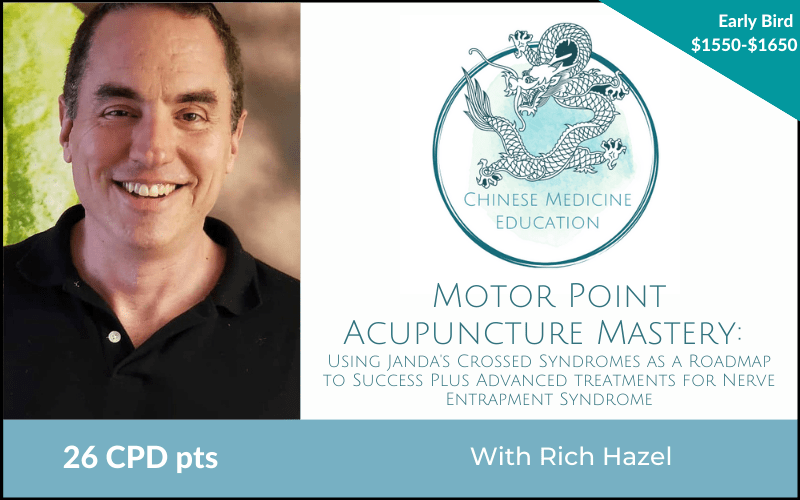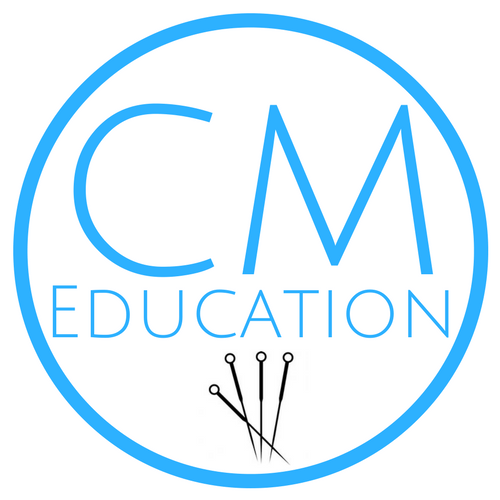
Check out our schedule for upcoming Chinese medicine seminars and workshops approved for Australian CPD points. Get direct access to live tuition from international and local TCM and acupuncture experts.
If you can’t attend, no need to worry, we film many of these Chinese medicine seminars and make them available as online courses at a later date. Contact us if you have any questions…

- This event has passed.
Motor Point Acupuncture Mastery: Using Janda’s Crossed Syndromes as a Roadmap to Success Plus Advanced treatments for Nerve Entrapment Syndrome
21 March, 9:00 am - 24 March, 5:30 pm
$300 – $1650
Discover the transformative world of Motor Point Acupuncture in this comprehensive course. Over four days, you’ll delve into the core essentials of contemporary acupuncture, exploring the pioneering work of visionaries like Vladimir Janda, Karel Lewit, Janet Travell, Joseph Wong, and C. Chan Gunn. Gain a deep understanding of upper and lower crossed syndromes, muscle physiology, and the role of rehabilitation in treating muscular dysfunction.
Throughout the course, you’ll explore the intricacies of Motor Points versus Trigger Points and learn how to harness the benefits of Motor Point Acupuncture. Discover when to treat trigger points and master the use of the Pointer device for precise treatment. Dive into the world of muscle inhibition and subconscious compensation patterns, understanding how proprioception and fascia play a pivotal role.
*This course will be conducted and presented solely by Dr Rich Hazel, with a few additional bonus content.
So who is this workshop for? This workshop is for qualified practitioners who are focused on treating acute or chronic pains and who work with professional or amateur athletes that would like to increase their performance and get reliable and measurable results!
Motor Point Acupuncture is highly effective and can produce fast and lasting results in the treatment of musculoskeletal conditions.
This seminar and workshop will assume some knowledge of anatomy so that we can get further into the actions of the muscles.
*Except for the first day, Day 2,3 and 4 are organized into 2 -3.5 hour halves.
Which encompasses 1 hour of lecture. 30 minutes of demo and 2 hours of needling practice
Day 1
Morning Session: Core Essentials and Pioneers of Contemporary Acupuncture
- Delve into the core essentials of Motor Point Acupuncture, setting the stage for a deep understanding of musculoskeletal therapy.
- Discover the pioneers of contemporary acupuncture, including Vladimir Janda, Karel Lewit, Janet Travell, Joseph Wong, and C. Chan Gunn, and their groundbreaking contributions.
- Explore the concept of Upper Crossed Syndrome and Lower Crossed Syndrome, learning how to identify and address muscular imbalances.
- Learn about the crucial distinction between Tonic and Phasic muscles and how it influences treatment strategies.
- Understand the fundamental differences between Motor Points and Trigger Points and their significance in acupuncture therapy.
- Explore the “Why” behind Motor Point Acupuncture and the multitude of benefits it offers to both practitioners and patients.
- Gain insights into when and why it’s essential to treat Trigger Points, enhancing your treatment efficacy.
- Master the practical use of the Pointer device, a valuable tool in precise acupuncture point location.
- Delve into the nuances of various types of muscle inhibition and their impact on patient care.
- Develop a foundational understanding of muscle physiology and its role in muscular dysfunction.
- Uncover the subtleties of subconscious compensation patterns that can affect the musculoskeletal system.
- Discover the critical role of rehabilitation in optimizing patient outcomes.
- Explore the intricate connection between proprioception, fascia, and their role in maintaining musculoskeletal health.
- Deepen your knowledge of Andry Vleeming’s Myofascial Slings and their implications in clinical practice.
- Investigate the Lateral Stabilization Subsystem, Deep Longitudinal Subsystem, Anterior Oblique Subsystem, Posterior Oblique Subsystem, and Intrinsic Stabilization Subsystem, gaining insights into their respective roles in muscular function.
- Understand how breathing patterns can impact musculoskeletal dysfunction, laying the foundation for holistic patient care.
Afternoon Session: Practical Application In the afternoon, put your knowledge into action as you focus on upper cross patterns. Gain hands-on experience by examining and treating specific muscles, including:
- Trapezius
- Rhomboid Major
- Levator Scapulae
- Semispinalis Capitis
- Pectoralis Major
- Pectoralis Minor
- Serratus Anterior
- Latissimus Dorsi
Conduct length tests for Pectoralis Major and Latissimus Dorsi, and perform Manual Muscle Testing (MMT) for Trapezius, Rhomboid Major, and Serratus Anterior. Explore length testing for neck extension and rotation, honing your skills in assessment and treatment.
This immersive day of learning provides a solid foundation in Motor Point Acupuncture, blending theory with practical application to prepare you for advanced techniques and transformative patient care.
Exploring Upper Crossed Patterns in Shoulder Pain
Morning Session: Upper Crossed Considerations for Shoulder Pain Gain a comprehensive understanding of Upper Crossed Syndrome and its relevance to shoulder pain. Dive into a detailed shoulder review, examining the following key muscles:
- Infraspinatus
- Teres Minor
- Supraspinatus
- Subscapularis
- Anterior Deltoid
- Medial Deltoid
- Posterior Deltoid
- Learn how these muscles interplay in shoulder function and dysfunction, setting the stage for targeted treatment strategies.
Master the art of Manual Muscle Testing (MMT) specific to the shoulder, enabling you to assess and diagnose muscular imbalances accurately. Explore Apley’s test, a valuable clinical tool for assessing shoulder range of motion and detecting structural issues.
Afternoon Session: Postural Issues and Their Impact on Shoulder Pain Investigate the role of postural abnormalities in causing shoulder pain and dysfunction. Delve into a practical exploration of muscles implicated in shoulder pain due to postural issues, including:
- Coracobrachialis
- Clavicular Head of Pectoralis Major
- Latissimus Dorsi (side lying)
- Serratus Anterior (side lying)
- Teres Major
- Long Head Biceps
- Short Head Biceps
- Triceps Long Head
- Perform length tests to identify muscular imbalances in the Coracobrachialis, Short Head Biceps, and Pectoralis Minor. Refine your assessment skills to target the specific muscles contributing to shoulder pain.
Conclude the day by conducting length tests for the Clavicular Head of Pectoralis Major, shedding light on the importance of identifying and addressing muscular issues in this region.
Day Two equips you with the knowledge and practical skills needed to assess, diagnose, and treat shoulder pain related to Upper Crossed patterns and postural abnormalities. By the end of this session, you’ll be prepared to offer effective solutions to alleviate shoulder discomfort and enhance your patients’ quality of life.
- Gluteus Maximus
- Gluteus Medius
- Gluteus Minimus
- Tensor Fasciae Latae (TFL)
- Quadratus Lumborum (QL)
- Longissimus
- Rectus Abdominis
- Transverse Abdominis
- Psoas
- Iliacus
- Grasp how imbalances in these muscles can lead to dysfunction in the lower extremities, ultimately resulting in knee pain.
Afternoon Session: Knee Flexors and Extensors in Detail Explore the flexors and extensors of the knee in-depth, gaining valuable insights into their roles and impact on knee function. Study the following muscles:
- Biceps Femoris
- Semitendinosus
- Gracilis
- Sartorius
- Rectus Femoris
- Vastus Lateralis
- Vastus Medialis
- Popliteus
- Understand how these muscles work harmoniously to facilitate knee movement and stability. Discover how imbalances in these muscle groups can contribute to knee pain and dysfunction.
By the end of Day Three, you’ll possess a profound comprehension of the connections between lower crossed patterns, pelvic dysfunction, and knee pain. Armed with this knowledge, you’ll be well-equipped to assess and address the root causes of knee discomfort, offering effective solutions to improve your patients’ musculoskeletal health.
Morning Session: Navigating Complex Neuromuscular Conditions. Dive deep into the intricate world of neuromuscular conditions and their acupuncture treatments:
-
- Sciatic Nerve Entrapment: Understand the complexities of sciatic nerve entrapment and how acupuncture can provide relief.
- Discogenic vs. Deep Gluteal Syndrome: Differentiate between discogenic pain and deep gluteal syndrome, honing your diagnostic abilities.
- Pseudo Sciatica: Uncover the nuances of pseudo sciatica and effective acupuncture interventions.
- Cluneal Nerve Entrapment: Explore the intricacies of cluneal nerve entrapment and its clinical significance.
- Superior Gluteal Nerve Entrapment: Learn to identify and treat superior gluteal nerve entrapment using acupuncture techniques.
- Muscular Insight: Targeting Trigger Points
Gain expertise in addressing muscular issues and trigger points in the following areas:
- Piriformis: Discover the art of treating the piriformis muscle, a common source of sciatic pain.
- Superior and Inferior Gemellus: Explore trigger points in the gemellus muscles and their relevance in musculoskeletal therapy.
- Obturator Internus: Understand the role of the obturator internus muscle and its trigger points in hip and pelvic pain.
- Peroneus Longus: Explore the peroneus longus muscle and its potential contributions to lower limb discomfort.
- Trigger Points in Quadratus Lumborum (QL): Master the technique of identifying and treating trigger points in the QL muscle.
- Superior Gluteal Nerve Trunk: Gain insights into the superior gluteal nerve trunk and its implications in lower body pain.
- Afternoon Session: Migraine Headache Relief through Acupuncture
Afternoon Session: Explore the trigger points and treatment strategies for addressing migraine headaches effectively, including:
- Rectus Capitis Posterior Major: Target trigger points in this muscle to alleviate migraine symptoms.
- Obliquus Capitis Inferior: Understand the role of the obliquus capitis inferior muscle in migraine pathology.
- Semispinalis Capitis: Explore the potential trigger points in the semispinalis capitis muscle and their relevance to migraines.
- Splenius Cervicis: Gain insights into trigger points in the splenius cervicis muscle and their connection to headaches.
- Sternocleidomastoid (SCM): Discover how trigger points in the SCM muscle can contribute to migraine headaches.
By the end of this advanced acupuncture session, you’ll possess the knowledge and skills necessary to address complex neuromuscular conditions and provide effective relief to patients suffering from migraine headaches. This day marks a significant step in your journey toward becoming a proficient and well-rounded acupuncture practitioner.
Details
Date: Thursday, 21st of March 2024 to Sunday, 24th of March 2024 Time: 9am – 5.30pm (on all 4 days) Venue: Vibe Hotel – 111 Goulburn Street, Sydney NSW 2000 CPD: 26 CPD Points Notes, Morning Tea, Afternoon Tea: Included
PRICING Early Bird Practitioner Rate: $1650 Early Bird Student (Full Time – Undergraduate): $1550
Full Practitioner Rate: $1850 Full Student (Full Time – Undergraduate) Rate: $1750
Terms and Conditions *Early Bird: Full payment is required 4 weeks prior to the start of the Seminar and Workshop *Registrations cancelled up to two weeks prior to the seminar will be refunded less 20%. We regret that refunds are not otherwise possible.
RECORDING If you wish to purchase for the recording only, please contact us to register your name. We will inform you that it will be available to purchase once it is ready. Please allow 3-4 weeks after the live seminar end date for the recording to be released.
Recording (Revisit) Access Fee for live participants and recording purchase – 5 years: $99
Register Now